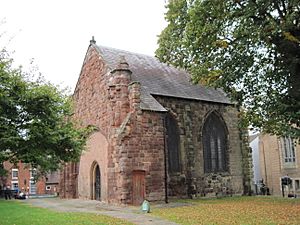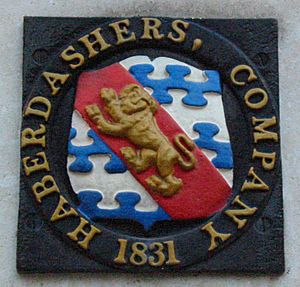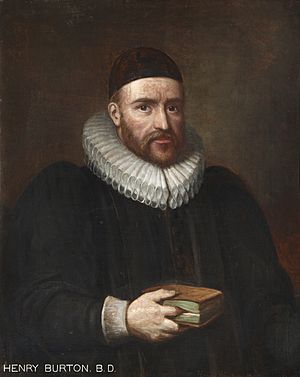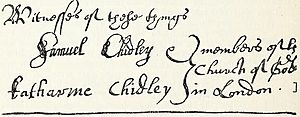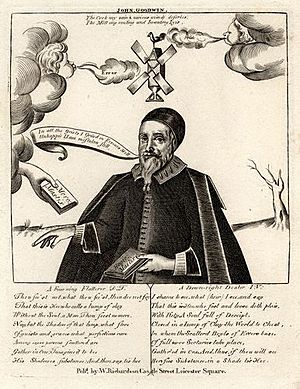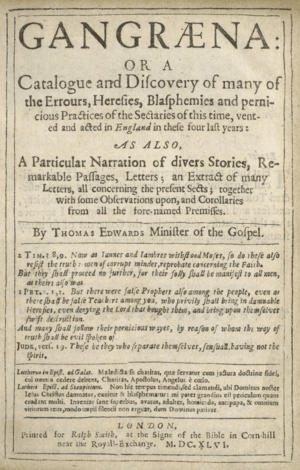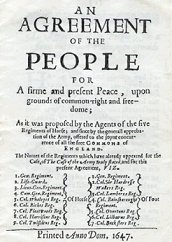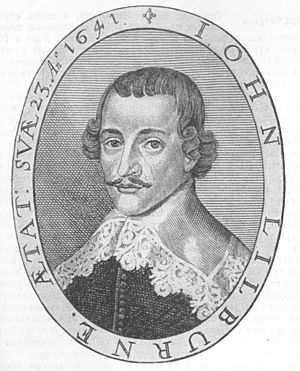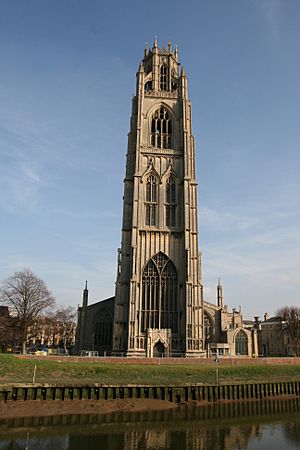Samuel Chidley facts for kids
Quick facts for kids
Samuel Chidley
|
|
|---|---|
| Personal details | |
| Born | 1616 Shrewsbury |
| Died | 1672 or later. Shrewsbury |
| Political party | Leveller |
| Spouse | Mary |
| Relations |
|
| Profession | Haberdasher |
| Signature | |
Samuel Chidley (1616–c. 1672) was an English Puritan who worked to change society. He was a strong believer in separatism, meaning he wanted churches to be separate from the government. During the English Civil War, he became an important leader of the Levellers, a group that wanted more rights for ordinary people. Samuel Chidley also worked for the government during the time of the Commonwealth and Protectorate. He became wealthy and fought for better social rules, morals, and money systems. After the king returned to power in the Restoration, Samuel lost his wealth. He then went back to live in his hometown of Shrewsbury.
Contents
Early Life in Shrewsbury
Samuel Chidley was born in 1616 in Shrewsbury. His father, Daniel Chidley, was a tailor. His mother was Katherine Chidley.
Samuel was christened at St Chad's Church, Shrewsbury in 1618. His parents, Daniel and Katherine, were known as separatists. This meant they wanted to separate from the official Church of England. They sometimes did not baptize their children in the parish church.
By 1629, St Chad's had baptized seven more Chidley children. Katherine Chidley also refused a church ritual after one of her births. This was part of a larger conflict between the church and Puritan families.
Moving to London and New Ideas
The Chidley family moved to London around 1630. They might have moved to escape religious problems or to find a new start. In London, Daniel Chidley helped start a separatist church. This group believed that Anglican parish churches were wrong. They broke away from another independent church.
Samuel Chidley lived with his parents in London. He was active in their separatist group. He supported John Lilburne, a key figure who fought against the king's absolute rule. The Chidleys also found good business chances in London. Daniel became a freeman of the Worshipful Company of Haberdashers in 1632. Samuel became an apprentice in the same company in 1634.
In 1641, Samuel's mother, Katherine Chidley, became famous. She wrote a book called The Justification of the Independant Churches of Christ. This book defended their separatist beliefs. It was a reply to a critic of their church ideas.
Samuel started writing pamphlets around 1643. He wrote A Christian plea for Christians baptisme. This book defended infant baptism against those who believed only adults should be baptized.
Speaking Out for Their Church
Samuel Chidley often spoke for his church in the 1640s. He always argued that old parish churches should be avoided. He believed they were like the "high places" of ancient religions, which were seen as places of false worship.
In 1645, Samuel and other church members met with Henry Burton. They called their group "the Separation." They wanted to tear down old churches. They believed these churches were polluted by past superstitions.
Katherine and Samuel Chidley worked together to start new separatist churches. One was in Bury St Edmunds in Suffolk. In 1646, they signed an agreement for this new church. It said members were "fully separated" from Anglicans. They also avoided places used for old worship.
A critic named Thomas Edwards wrote about the Chidleys. He said they were spreading their "poison" outside London. He claimed they worked together, with one writing and the other helping.
Samuel Chidley continued to focus on the "high places" idea. He used it to show how his church was different from other independent churches.
In 1648, Samuel Chidley debated with John Goodwin. Goodwin was a minister who tried to mix old church ways with new ideas. Chidley argued that his church members should not mix with Goodwin's. He said Goodwin's followers still used "Idolls Temples" and baptized children of non-believers. The debate quickly turned to the topic of "high places."
Samuel Chidley, the Leveller
Samuel Chidley became a well-known Leveller. The Levellers were a political group that wanted more rights for common people. Samuel Chidley and Thomas Prince became the treasurers of the movement.
In 1647, the Levellers created the Agreement of the People. This document listed demands to protect the gains made in the Civil War. It was discussed at the Putney Debates. Samuel Chidley helped spread this document.
In November 1647, there was a small uprising called the Corkbush Field mutiny. It was quickly stopped by Oliver Cromwell. A Leveller soldier was executed. Samuel Chidley was very upset by this. He and others asked Parliament to investigate the soldier's death.
Chidley and Prince were briefly jailed for presenting their petition. Parliament called their demands "seditious." However, Samuel Chidley was released quickly. He continued to organize petitions for the Levellers. He likely helped with petitions asking for more voting rights and help for poor workers. His mother, Katherine, is thought to have written a women's petition in 1653.
A Businessman's Life
Even though he was a radical activist, Samuel Chidley also did well in business. He became a full member of the Haberdashers' Company in 1649. His mother, Katherine, continued their family business. She supplied stockings to the army.
In 1649, Samuel Chidley got a job as Register of Debentures. This job was part of a plan to pay soldiers. Soldiers received special papers called debentures instead of pay. They could use these to buy land that used to belong to the king.
Chidley used his job to buy and sell these debentures. He bought fifteen plots of crown land. He also built up properties in London. However, he faced accusations and lawsuits. He continued to do well during the time of the Protectorate.
Campaigns and Writings
Chidley wrote many short books and leaflets. He used them to create discussion and controversy.
Fighting the Death Penalty
Chidley strongly campaigned against the death penalty for theft. In 1652, he published a book called Retsah, a cry against a crying sinne. Retsah is a Hebrew word for killing or murder.
He argued that killing someone for stealing was wrong. He believed it went against God's laws. He said that the punishment should fit the crime. He pointed out that if stealing a small amount of money could lead to hanging, it might encourage thieves to commit murder to avoid being caught.
Chidley suggested that thieves should instead be forced to work to pay back what they stole. He mentioned that this was done in the Dutch Republic. He believed this would reduce both theft and murder.
Public Money Problems
Chidley also campaigned about public debt. He wanted the government to pay back money owed to people faster. In 1652, he tried to organize a large petition for creditors.
He continued his efforts in 1653. He wrote A Remonstrance to the Creditors of the Common-Wealth of England. In it, he criticized how Parliament was handling the country's debts.
Thunder from the Throne of God
In 1656, Chidley wrote Thunder from the Throne of God Against the Temples of Idols. This book attacked church towers and steeples. He called them "relics of the Catholic past." He demanded they be completely destroyed. He wanted "Down with them and their Babylonish Bells."
This book was presented to Parliament. Chidley was called before the House of Commons. He confirmed he wrote the book and stood by its contents. He was briefly held in custody but released a few days later.
To His Highness
The next year, Chidley wrote to the Lord Protector and Parliament. He complained that Parliament was not doing enough. He said they had not ended the death penalty for theft. He also said they had not paid the public debt.
He described a land where the poor were not supported. He said justice was denied, and lawyers profited from lies. He urged Parliament to help the oppressed and break every burden.
Later Challenges and Hard Times
Chidley faced more problems as the years went on. In 1657, he got into trouble with the House of Commons again. He was involved in a legal case against a Member of Parliament. This was seen as a breach of parliamentary rules. He was again briefly held in custody.
The return of the king in 1660 brought great difficulties for Chidley. The king took back lands that had been sold by the Commonwealth government. This ruined many people, including Chidley, who had made their money from land deals.
In 1664, he was jailed for refusing to take certain oaths. He is also believed to have lost his family in the Great Plague of London in 1665. Much of his property was destroyed in the Great Fire of London in 1666. In 1668, he was jailed again for disturbing the peace.
Final Years
Samuel Chidley spent his last years in his hometown of Shrewsbury. He lived in a small house in 1672. He died sometime after that year.
Images for kids
 | Selma Burke |
 | Pauline Powell Burns |
 | Frederick J. Brown |
 | Robert Blackburn |


